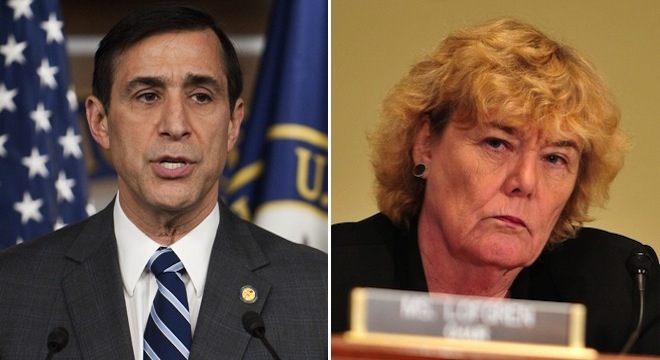Rep. Zoe Lofgren (D-CA) and Rep. Darrell Issa (R-CA) have taken it upon themselves to convince the rest of their colleagues to kill a recently-introduced and controversial bill aimed at curbing online piracy.
The two members of the House, both from California, each represent districts that contain numerous tech companies (Rep. Lofgren represents the 16th Congressional District, which includes Silicon Valley capital San Jose).
On Tuesday, they sent a brief but pointed letter to the rest of the body urging them to “carefully consider the risks” that the proposed Stop Online Privacy Act (SOPA) would have on the Internet, suggesting it would create a “sprawling new regulatory regime on the Internet” that could pose serious risks for “this vital engine of our economy.”
The full text of the letter, signed by both Rep. Lofgren and Rep. Issa, obtained by TPM reads as follows:
Dear Colleague:
The Judiciary Committee is close to consideration of H.R. 3261, the Stop Online Piracy Act. We write to call your attention to a recent article about the bill in the Los Angeles Times, entitled, “A bipartisan attempt to regulate the Internet?” (available at http://opinion.latimes.com/opinionla/2011/10/technology-a-bipartisan-attempt-to-regulate-the-internet.html).
We agree with the goal of fighting online copyright infringement, and would support narrowly targeted legislation that does not ensnare legitimate websites. We also believe that a consensus on the issue between the content and technology industries is achievable. As the attached article makes clear, H.R. 3261 unfortunately does not follow a consensus-based approach. It would give the government sweeping new powers to order Internet Service Providers to implement various filtering technologies on their networks. It would also create new forms of private legal action against websites–cutting them off from payment and advertising providers by default, without any court review, upon a complaint from any copyright owner, even one whose work is not necessarily being infringed.
Online innovation and commerce were responsible for 15 percent of U.S. GDP growth from 2004 to 2009, according to the McKinsey Global Institute. Before we impose a sprawling new regulatory regime on the Internet, we must carefully consider the risks that it could pose for this vital engine of our economy.
Rep. Lofgren had earlier called the bill “the end of the Internet as we know it,” so the new tone struck in her letter with Rep. Issa is tame by comparison.
The Los Angeles Times article referenced by the lawmakers in their letter is actually an editorial by John Healey, a former business writer.
In his piece, Healey writes that the “the private right of action in the House bill makes the Senate provision seem tame by comparison.”
Introduced to the House on October 26, 2011, by House Judiciary Chairman Lamar Smith (R-TX), the Stop Online Piracy Act (SOPA) is in many ways the direct descendant of a failed Senate bill called Protect IP. Like Protect IP, SOPA would give the federal government more power to take down the domain names (addresses) of websites whose users’ are suspected of pirating copyrighted media online and violating intellectual property in other ways.
At the time he introduced it, Smith said: “The Stop Online Piracy Act helps stop the flow of revenue to rogue websites and ensures that the profits from American innovations go to American innovators.”
But the bill has received a hefty amount of criticism from industry groups representing Internet Service Providers and the big web companies such as Google and Yahoo, as well as freedom-of-information activists and tech bloggers.
Meanwhile, some of the nation’s most powerful and extensive copyright holders, represented by the Recording Industry Association of America (RIAA) and the Motion Picture Association of America (MPAA) have come out in favor of the bill.
On Tuesday, just hours before the letter from Rep. Lofgren and Rep. Issa, RIAA CEO Cary Sherman published a rebuttal on CNET to a critical column on the legislation from CNET editor Molly Wood.
In his rebuttal, Sherman writes: “Both the House and Senate have proposed bipartisan bills to help address this growing form of digital theft. All of us — allies, critics, would-be allies — should take the time to read the bills. Understand the provisions and author’s intent. No bill is perfect and, no doubt, improvements can be made. We stand ready to work with anyone who wants to improve the bill.”
Here’s the House bill and here’s the Senate version. Whether either advances into law remains to be seen. The House Judiciary Committee is due to begin hearings on SOPA on November 16.






